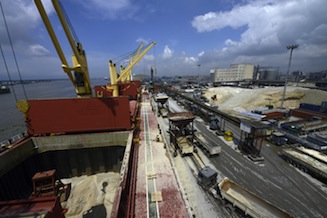Sand is unloaded from the vast hold of the Pintail cargo ship into waiting trucks at the port of Apapa in Nigeria’s financial capital, Lagos.
But on board, port health officials are keen to stop the crew bringing anything else into Nigeria, especially the Ebola virus, which has claimed more than 3,000 lives this year in West Africa.
In a cabin on board the 56,880 tonne vessel, which arrived in Lagos on Sunday, the 19-strong crew are undergoing daily temperature checks until they eventually weigh anchor.
Twenty people have contracted Ebola in Nigeria and eight have died, according to the World Health Organization.
But with no case since September 8 and no one under surveillance, officials are keen to keep it that way.
“This (the screening) is important because we still have an outbreak (of Ebola) in other parts of the (West Africa) sub-region,” Alex Okoh, director of point of entry health services in Lagos, told AFP.
“Whatever their route is, we want to ensure that the crew is safe.”
Screening — part of wider checks at all entry and exit points in Nigeria — is no small task at the sprawling port, which is west Africa’s busiest.
Apapa has 33 berths capable of accommodating three ships each and anywhere from 50 to 70 or more ships are docked at one time every day.
Port health officials, wearing protective masks and latex gloves, get crews to fill out health forms: last port of call, next port of call, plus the names and details of everyone on board.
Daily temperature readings are also recorded, allowing ship owners easy access to information, particularly if the vessels make stops along the west African coast, including in Ebola-affected nations.
Port authorities in Sierra Leone, Liberia and Guinea, which have been worst-hit by Ebola, as well as Senegal are conducting similar screening programmes, a spokeswoman for the UN health body said.
“The health of the crew is very important. It’s a priority. It’s good modern practice,” said Ruslan Rosenko, the Ukrainian master of the Cyprus-flagged bulk carrier.
















